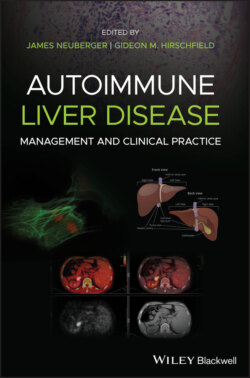Читать книгу Autoimmune Liver Disease - Группа авторов - Страница 60
Risk Factors for Autoimmune Diseases Genetics Complex Genetic and Monogenic Diseases
ОглавлениеComplex genetic diseases require an interplay of genes and environmental factors that may manifest as more than one clinical disease (Figure 2.1) [1]. Overall, environmental exposures are more important than genetics in shaping the immune repertoire. Thus, a person's “exposome” – the lifelong sum of all endogenous and exogenous environmental exposures interacting with genetic and epigenetic factors – can favor autoimmunity or protect against it.
Genome‐wide association studies (GWAS) in autoimmune diseases, including AILDs, have demonstrated shared associations with HLA alleles and single nucleotide polymorphisms (SNPs) of genes related to innate immunity and adaptive immunity [15]. These include genes encoding interleukins, interleukin receptors, proinflammatory cytokines and their receptors, cytotoxic T lymphocyte antigen (CTLA)‐4 (a mediator of senescence and apoptosis of activated T cells), signal transducer and activator (STAT)‐4, chemokine receptors and CD69 (involved in migration of lymphocytes from lymph nodes and development of immunologic “memory”). However, odds ratios for each gene's contribution to risk for autoimmunity are quite small, suggesting that multiple SNPs are required for development of one or more of the 80 known autoimmune diseases.
